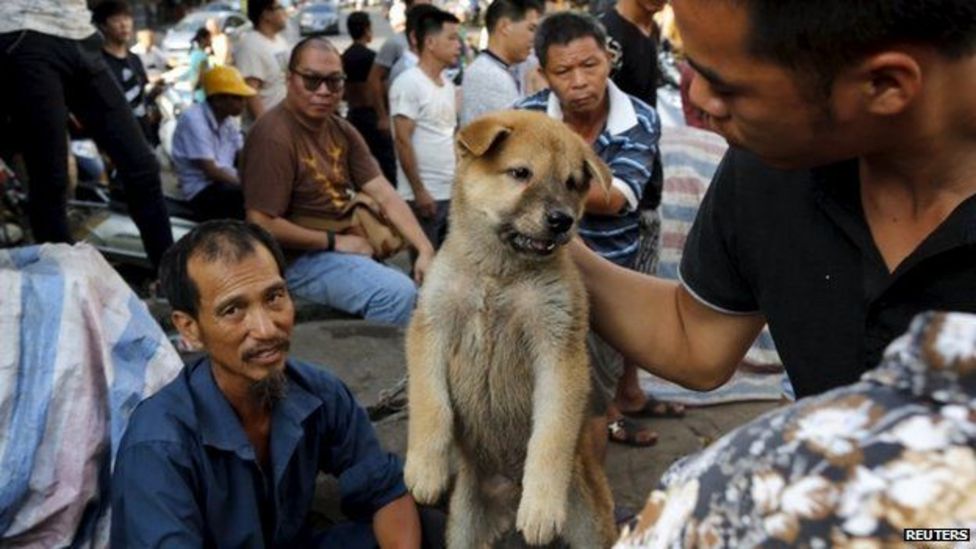Introduction
The question of whether Chinese people eat dogs is a topic that has sparked curiosity and debate for many years. It's a complex issue influenced by cultural, historical, and regional factors. This comprehensive article aims to shed light on the practice of dog consumption in China, examining its prevalence, nuances, and ethical implications.
- Problem: The ambiguity surrounding dog consumption in China leaves many people wondering if it is a widespread practice.
- Agitation: This uncertainty can lead to misunderstandings, stereotypes, and cultural clashes.
- Solution: By exploring the topic in depth, we can gain a clearer understanding and foster respectful dialogue.

Source www.bbc.com
Dogs as Food in Chinese History
Ancient Origins
- Archaeological evidence suggests that the consumption of dog meat in China dates back to as early as 10,000 years ago.
- In certain Neolithic cultures, dogs were considered both companions and a source of sustenance, similar to the role they played in many other ancient societies.
Cultural Significance
- During the Han dynasty (206 BC-220 AD), dog meat was widely consumed in northern China.
- It was believed to possess medicinal properties and was often associated with strength and virility.
Regional Variations
Southern China
- In southern China, dog meat consumption has historically been less common.
- Influenced by Buddhist traditions, many southerners view dogs as companions and protectors, leading to a general aversion to eating them.
Northern China
- In northern China, dog meat remains more popular, particularly in rural areas.
- In some provinces, such as Hebei and Shandong, dog meat is a traditional delicacy often served in restaurants and street stalls.
Ethical Concerns
Animal Welfare
- Dog consumption has raised concerns among animal rights activists worldwide.
- Critics argue that it is cruel and unnecessary, especially given the availability of other food sources.
- They highlight the suffering and fear experienced by dogs raised for human consumption.
Zoonotic Diseases
- There are also health concerns associated with dog consumption.
- Dogs can carry diseases that can be transmitted to humans, such as rabies and tapeworms.
- Proper handling and preparation are essential to minimize these risks.
Prevalence and Acceptance
Declining Trend
- In recent years, dog consumption in China has been declining.
- Influenced by urbanization, pet ownership, and growing awareness of animal welfare issues, many Chinese people now consider dogs as valued companions.
Social Stigma
- Dog consumption has become increasingly stigmatized in China.
- In urban areas, it is generally considered an unacceptable practice and may be met with disapproval.
- However, in some rural regions, it remains a part of traditional culinary culture.
Comparison of Dog Consumption Practices
| Country | Prevalence | Cultural Significance | Ethical Concerns |
|---|---|---|---|
| China | Historical, declining | Varied by region | Rising |
| South Korea | Historical, declining | Traditional delicacy | Controversial |
| Vietnam | Declining | Rare, but consumed by some | Animal welfare concerns |
| Switzerland | Historical, banned | Cultural tradition | Banned for animal welfare reasons |
| Mexico | Declining | Regional delicacy | Animal welfare concerns |
| United States | Rare | Considered unethical | Animal welfare concerns |
Conclusion
The practice of dog consumption in China is a multifaceted issue that reflects a complex interplay of cultural, historical, and ethical factors. While it has declined in recent years, it remains a topic of debate and controversy.
As we navigate the complexities of this subject, it is important to approach it with empathy, respect, and a commitment to fostering dialogue. Whether one chooses to consume dog meat or not is a personal decision that should be respected.
We invite you to explore our other articles on pet ownership, animal welfare, and the evolving relationship between humans and animals in our rapidly changing world.
FAQ about Do Chinese People Eat Dogs
Do Chinese people eat dogs?
Answer: While dog meat is consumed in some parts of China, it is not a common dish and is generally frowned upon by the majority of the population.
Why do some Chinese eat dogs?
Answer: In certain regions, dog meat has been traditionally consumed as a delicacy or for medicinal purposes. However, these practices are declining and are not representative of the entire Chinese population.
Is dog meat legal in China?
Answer: Dog meat is illegal in some cities and provinces in China, but it is still legally sold in other areas.
What is the controversy surrounding dog meat consumption in China?
Answer: The consumption of dog meat has sparked controversy due to animal welfare concerns and the spreading of disease. Many people believe it is cruel and unnecessary.
How common is dog meat consumption in China?
Answer: Dog meat consumption is relatively uncommon in China, with estimates suggesting that only a small percentage of the population consumes it.
What alternatives to dog meat are available in China?
Answer: There are numerous alternatives to dog meat available in China, including various meats, poultry, seafood, and vegetarian options.
Is dog meat safe to eat?
Answer: While some people believe dog meat has health benefits, the consumption of dog meat is not recommended as it can carry parasites and diseases.
Does dog meat taste good?
Answer: The taste of dog meat varies depending on the individual's preferences, but it is generally described as having a gamy flavor.
What is the future of dog meat consumption in China?
Answer: The future of dog meat consumption in China is uncertain. However, increasing awareness of animal welfare and the spread of diseases has led to a decline in its popularity.
Is it acceptable to judge Chinese people for eating dogs?
Answer: It is important to avoid making generalizations or assumptions about entire populations based on cultural practices. While dog meat consumption is a controversial topic, it should not be used to judge an entire group of people.
Nobody seemed to notice that the show’s top dog, Bea. suddenly disappeared.